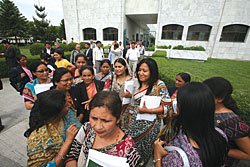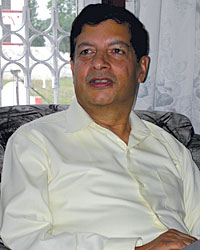 KIRAN PANDAY |
Although the committee said the draft was passed unanimously, differences have surfaced in the NIPC's report regarding state structure, the system of government, national defence policy, national interest and border issues. "Our first job should be to delineate fundamental issues raised in the committee," says Pari Thapa, a member of the Constitutional Committee. "And if we agree on these issues, the constitution writing process will be completed within the stipulated time."
The NIPC concept paper has proposed a provision of conscription for all adults and compulsory identity cards or passports for Indian and Chinese citizens entering Nepal. NC has disagreed about this concept stating it mentions preparing Maoist PLA soldiers who are over 18 for army integration.
In spite of the individual committees' delays the day of 28 May 2010 is still scheduled for promulgation of the new constitution.
Spokesperson at the CA secretariat Mukunda Sharma is still hopeful it can be written within the stipulated timeframe. He says the committees' delay in submitting their reports will not affect the CA schedule. "We have allotted five days for discussing each draft concept submitted by the committees," Sharma says adding, "Even if all committees had submitted their reports on time, they would have had to wait their turn."
The Committee for Protection of Fundamental Rights of the Minority and Marginalised Groups has also finalised its concept, which will be submitted to the CA chair on Thursday. However, other committees are still embroiled in discussion.
Sharma thinks the growing differences among political parties took its toll on the work of the CA committees. The CA sessions were disrupted by political protests, rostrum gheraos and festival breaks. The CA committees also failed to meet because of political deadlock. "Despite all things, the committees carried out their duty of drawing up their concept draft. It takes time," he says, "But it will not affect the scheduled date for finalising and endorsing the new constitution."
The first five months passed by with preparing and approving the CA procedure, which delayed its first sitting. A disagreement over whether members should vote according to their conscience or follow the party whip had delayed approval of the procedure, which was eventually approved after dropping the controversial clause altogether.
The thematic committees were supposed to each come up with a draft of clauses by mid-April, but the submission date was delayed by a month. The received drafts should be debated and presented to the CA by 15 August. Thereafter, public hearings will be held on the draft up to 15 December. "Considering the present work pace of the committee, we are hopeful we will be able to prepare the preliminary draft of the constitution and take it to the public on time," Thapa told Nepali Times.
The public's suggestions will be incorporated and debated at a Constitutional Committee meeting before the draft is finalised and debated in the full CA session - before the new constitution is promulgated on 28 May.
"Federalism doesn't suddenly bring development"
Interview with Shankar Sharma, former Secretary of National Planning Commission
From an economic point of view, how feasible is it to turn Nepal into a federal state? 
The economic activities and resources in Nepal are limited to certain districts only. Eighty-five per cent of tax revenue is collected from customs offices in Parsa, Jhapa, Morang, Sindhupalchok, Kathmandu, Lalitpur and Rupendehi. Although maximum revenue is collected in the Tarai, most goods are consumed in the Kathmandu. Thus, the maximum contribution to the taxes is made by residents of the Valley. Federalism will be challenging as tax collection and economic activities are clustered in certain parts of the country.
How far will federalism live up to the expectations of the people with regards to economic growth, employment and development?
In a federal country, the state government is responsible for the daily administration, education, health and development of the state, while the central government takes care of issues that the state government cannot address. Federalism encourages people to be more involved in the development of their states and they reap the benefits directly. But when we talk about the development of the whole country, we also have to think about the distribution of foreign grants and taxes. This depends on the central government.
The constitution gives the states the right to formulate their economic development plans and policies. But there might be difficulties regarding resources and capabilities - skilled manpower, infrastructure, institutions are severely lacking in some regions. Development will take time, federalism will not suddenly bring about these changes.
What are the economic challenges as we enter a federal system?
The first challenge is distribution revenues raised from VAT, income tax, excise duty and other types of taxes among the states. The second challenge concerns the handover of resources. One concern is regarding how efficient the states will be in collecting taxes on land, assets, entertainment etc, which until now has been incompetently handled by lower administrative bodies.
This work is difficult politically as well as administratively. The economic and financial discipline poses the third challenge. In order to be able to utilise their natural resources efficiently, then the states need to be able to manage the corresponding budget and not allow it to line politicians' pockets.
We do not have legal provisions regarding distribution of natural resources, and it is also going to be a challenge as it includes the issue of ownership, conservation and allotment of their benefits.
How should the states be established in consideration of the economical factors?
The basis for establishing the states should be complimentary. Our major economic sectors are agriculture, hydropower, tourism and industry to some extent. The Tarai is based on agriculture and industry, the hills have lucrative opportunities in hydropower and the mountain regions are important for tourism.
While establishing states, these four economic sectors have to be taken into consideration. We need to understand two issues here, one is the transportation of goods and the other is the ease with which one can travel. Right now, Biratnagar, Kathmandu and Bhairahawa are the economically thriving districts, which cater for their adjoining regions. Therefore, in terms of economic activities, the country should have three major states.
As we establish the states, some might be affluent while others might be backward. In such a case how will we be able to achieve economic equality among them?
To ensure economic equality, two provisions can be made in the constitution. One is to fulfill the basic needs of all the states. The second is to distribute resources according to the recommendations of the fiscal commission, which considers issues like poverty, infrastructure and regional balance. This will pave way for granting a higher budget to weak states.


